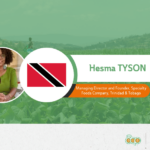FOCUS: FFM SPS PROGRAMME
- 08/04/2019
- Posted by: Gaetan Dermien
- Category: Uncategorized
Rome, Italy: At the International Plant Protection Convention, 25 ACP countries mobilised around sanitary and phytosanitary (SPS) issues and priorities
On 1–2 April, COLEACP organised an event in Rome to present its Fit For Market SPS programme (FFM SPS) to the competent authorities of African, Caribbean and Pacific (ACP) countries. The event provided an opportunity to discuss SPS issues affecting the ACP fruit and vegetable sector and possibilities for COLEACP support within the framework of FFM SPS, and to review the first requests for support already received by COLEACP. The event took place within the IPPC’s Commission on Phytosanitary Measures.
Twenty-five ACP countries were represented through the Directorates of their National Plant Protection Organisations (NPPOs): Benin, Burkina Faso, Cameroon, Chad, Côte d’Ivoire, Dominican Republic, Fiji, Gambia, Ghana, Guinea, Jamaica, Kenya, Liberia, Madagascar, Malawi, Mali, Nigeria, São Tomé and Príncipe, Senegal, Sierra Leone, Suriname, Tanzania, Togo, Uganda and Zimbabwe.
In the context of changes in European plant health regulations (which came into force in December 2019) and those on the use of plant protection products, NPPOs must act quickly to ensure they have in place the necessary human and financial resources and skills for all operational procedures required by these changes in European market rules to be effective. COLEACP’s FFM SPS programme was launched to assist in this.
COLEACP presented to the NPPOs its intervention strategy, which is based on the four foundations of effective SPS systems: governance, operational processes, skills management and communication. FFM SPS prioritises the fruit and vegetable sector in view of the multiple SPS challenges in this sector, on domestic, regional and international markets, that are faced by all ACP countries.
*FFM SPS is funded by the European Union at the request of the ACP Group of States

![EU and GB approval changes (August-November 2024) 9-FFM+-[ENG]](https://news.colead.link/wp-content/uploads/2024/06/9-FFM-ENG-150x150.jpg)

